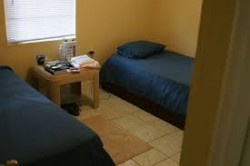How Transitional Housing Can Help You Stay Clean & Sober
Generally, transitional housing provides shelter for men and women who are in recovery and meet certain criteria regarding their work status and the number of months they have been clean and sober. According to the Harvard Square Homeless Shelter, such housing is generally provided to those in recovery for a period of 2-12 months depending on individual needs as well as various other factors. This turning point in making the move from inpatient treatment to sober living can help to reduce the risk of relapse during the early months following residential care.
Why Transitional Housing Works
Transitional housing is an effective means of shelter for those in recovery simply because it extends a helping hand to those who are in their early, transitional stages of recovery and may not necessarily be ready for living on their own but no longer need the strong confines of residential care. Transitional housing provides the following:
- safe, clean and sober shelter for those in recovery
- continued monitoring for drug use through random drug screenings and other methods
- continued monitoring of adherence to house rules including curfews, job maintenance, sobriety and involvement in treatment groups
- case management and support
How This Helps You Stay Sober

Transitional sober homes provide a place for you to stay that can aid in your recovery.
Transitional housing can help you stay sober by providing you with the continued involvement and micromanagement that was received in treatment despite the fact that you are given some leeway and ability to transition back into society. Transitional housing will still be backed by rules and regulations that you must adhere to in order to maintain your residence. Such rules may include:
- curfew
- maintaining steady employment or actively seeking steady employment
- maintaining an active role in counseling, therapy and support groups
- attending household support groups on a regular basis
- maintaining household chores
- paying bills
- being respectful of others in the household
- maintaining sobriety
Each transitional housing unit or home will have its own rules but generally they all require residents to remain sober, to remain active in treatment if such is recommended by their counselors or therapists, to remain gainfully employed and to take part in regular activities such as performing household chores and paying bills. All of this can help you to reintegrate back into the norms of society.
Being involved in treatment, taking part in support groups, going to work and maintaining household chores will also keep you very busy. The new roles that you must take on while in transitional housing will help you to stay sober simply because you will not have as much spare time to think about using drugs. For some, just staying busy can greatly reduce the risk of relapse when compared to having too much free time on their hands.
While the decision to stay sober will ultimately be up to you, transitional housing can make the move from treatment back into society much safer and more controlled. This is just one of the many steps you will take as you make the journey from drug addiction to recovery and sobriety.
 5 Tips for Finding Clean and Sober Transitional Living -
Living in a clean and sober environment right after rehab can be the crucial component that helps you achieve long-term recovery.
5 Tips for Finding Clean and Sober Transitional Living -
Living in a clean and sober environment right after rehab can be the crucial component that helps you achieve long-term recovery.  10 Tips for Staying Clean and Sober in Sober Housing -
Sober living helps people make the transition from rehab to a life in recovery, so most people there are just starting their journey to sobriety. There are several ways to make the best of this.Embracing it help s you
10 Tips for Staying Clean and Sober in Sober Housing -
Sober living helps people make the transition from rehab to a life in recovery, so most people there are just starting their journey to sobriety. There are several ways to make the best of this.Embracing it help s you  Benefits of Sober Living for Living a Sober Life -
Sober housing programs offer you a semi-structured living environment where you can get comfortable with leading a sober life before going into a normal living environment.
Benefits of Sober Living for Living a Sober Life -
Sober housing programs offer you a semi-structured living environment where you can get comfortable with leading a sober life before going into a normal living environment.  Tips for Staying Clean and Sober -
When starting a new, sober life the idea of maintaining this may seem daunting. Joining support groups, taking up new hobbies and other things can truly help!
Tips for Staying Clean and Sober -
When starting a new, sober life the idea of maintaining this may seem daunting. Joining support groups, taking up new hobbies and other things can truly help!  10 Benefits of Clean and Sober Living -
A hugely important and central part of living clean and sober is that you are able to connect with aspects of life, socializing, and being active that does not involve mind-altering substances.
10 Benefits of Clean and Sober Living -
A hugely important and central part of living clean and sober is that you are able to connect with aspects of life, socializing, and being active that does not involve mind-altering substances.